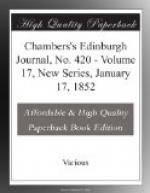possible inquiry, but without obtaining more satisfactory
information, the General and his family put on mourning.
The shock he had sustained produced bad effects on
an already enfeebled constitution, and accelerated
the veteran’s decease. During his last
days, he frequently alluded to ‘poor Bessie’
in affectionate terms; and we then gathered at least
one fact relating to her past history. Her lover,
it seems, had been suddenly carried off by malignant
fever on the eve of their wedding-day, bequeathing
to Bessie all his property; and Bessie, who had never
known serious sorrow before, gave no sign, by sigh
or lamentation, that she bemoaned the untimely fate
of her betrothed, but withdrew herself from friends
and connections, and became the restless, homeless,
harmless being at whose peculiarities we had so often
laughed, little thinking that tears of secret anguish
had probably bedewed the pathway of her early wanderings.
This very concealment of her grief, however, may have
arisen from the peculiar idiosyncrasy which procured
for her among all who knew her the name of the Mysterious
Lady. But we will not talk of her in the past
tense. We are so sure of her being alive, that
we are even now anxious to conclude our visit to the
pleasant house where this is indited, feeling a presentiment
we cannot overcome, that the first interesting object
we shall see on returning home is that mystical card
which has so often startled and baffled our curiosity—’Miss.
Jerningham.’
CASH, CORN, AND COAL MARKETS.
A circle of a few hundred yards only in diameter,
of which the centre should be the Duke of Wellington’s
statue in front of the Royal Exchange, London, would
enclose within its magic girdle a far greater amount
of real, absolute power, than was ever wielded by the
most magnificent conqueror of ancient or modern times.
There can be no doubt of this; for is it not the mighty
heart of the all but omnipotent money force of the
world, whose aid withheld, invincible armies become
suddenly paralysed, and the most gallant fleets that
ever floated can neither brave the battle nor the breeze?
And this stupendous power, say moralists, has neither
a god, a country, nor a conscience! To-day, upon
security, it will furnish arms and means to men struggling
to rescue their country from oppression, themselves
from servitude and chains—to-morrow, upon
the assurance of a good dividend, it will pay the
wages of the soldiery who have successfully desolated
that country, and exterminated or enslaved its defenders.
Trite, if sad commonplaces these, to which the world
listens, if at all, with impatient indifference.
I have not a very strong faith in the soundness of
the commercial evangel upon this subject; still, the
very last task I should set myself would be a sermon
denunciative of mammon-worship—mammon-love—mammon-influence—and
so on; and this for two quite sufficient reasons—one,
that I have myself, I blushingly confess, a very strong




